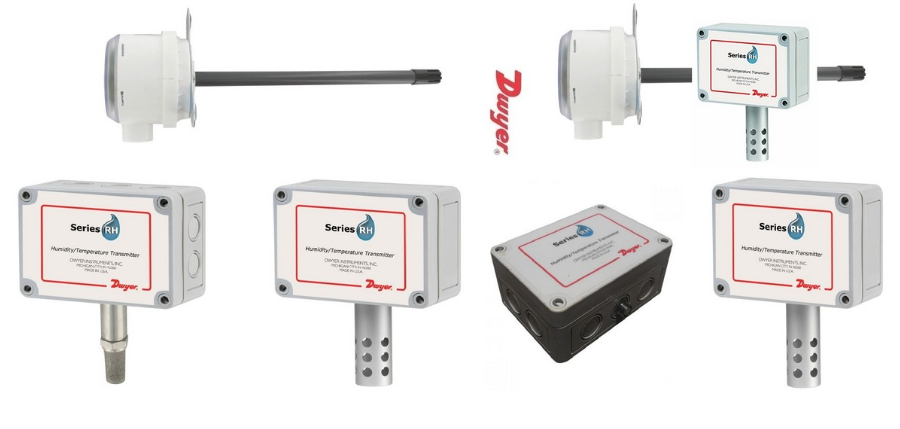Cách chọn cảm biến độ ẩm phù hợp cho kho lạnh, nhà máy dược và phòng lab
Ngày đăng: 30/10/2025
Trong các môi trường yêu cầu kiểm soát vi khí hậu nghiêm ngặt như kho lạnh bảo quản thực phẩm, nhà máy dược phẩm hay phòng thí nghiệm, độ ẩm luôn là thông số then chốt ảnh hưởng đến chất lượng sản phẩm và độ an toàn vận hành. Để đảm bảo độ ổn định và độ chính xác cao, việc lựa chọn cảm biến độ ẩm phù hợp là bước đầu tiên và quan trọng nhất.
1. Tầm quan trọng của cảm biến độ ẩm trong hệ thống HVAC – BMS
Cảm biến độ ẩm không chỉ giúp theo dõi tình trạng không khí mà còn là thành phần cốt lõi trong hệ thống điều khiển tự động BMS và HVAC.
Một thiết bị đạt chuẩn giúp:
-
Duy trì độ ẩm lý tưởng cho sản phẩm hoặc quy trình.
-
Ngăn ngừa hiện tượng ngưng tụ, ẩm mốc hoặc tĩnh điện.
-
Bảo vệ thiết bị điện, máy móc và vật liệu nhạy cảm.
-
Tối ưu năng lượng nhờ điều khiển chính xác quạt, van gió, máy hút ẩm hoặc hệ thống lạnh.
2. Tiêu chí chọn cảm biến độ ẩm phù hợp cho từng môi trường
a. Kho lạnh – Môi trường nhiệt độ thấp, độ ẩm cao
-
Dải đo khuyến nghị: 0–100% RH
-
Yêu cầu đặc biệt: cảm biến có khả năng chống ngưng tụ và hoạt động tốt ở nhiệt độ âm.
Gợi ý: Sử dụng cảm biến Dwyer có đầu dò tách rời, chống ẩm và chống đóng băng, giúp duy trì độ chính xác lâu dài trong môi trường lạnh.

b. Nhà máy dược phẩm – Kiểm soát nghiêm ngặt theo tiêu chuẩn GMP
-
Độ chính xác cao: ±2% RH hoặc tốt hơn.
-
Tích hợp dễ dàng: tương thích tín hiệu 4–20mA, 0–10VDC để kết nối PLC hoặc hệ thống BMS.
-
Tùy chọn hiệu chuẩn: nên chọn thiết bị có thể hiệu chuẩn tại chỗ (Field Calibration) để đảm bảo liên tục dữ liệu trong quá trình sản xuất.
Khuyến nghị: Dòng cảm biến Dwyer Series RHP hoặc HHT là lựa chọn lý tưởng.
c. Phòng lab – Môi trường yêu cầu phản hồi nhanh và ổn định
-
Tốc độ phản hồi nhanh, giúp điều khiển điều hòa và thiết bị hút ẩm chính xác.
-
Tích hợp đo nhiệt độ – độ ẩm giúp giảm sai lệch do nhiệt môi trường.
-
Cấu tạo đầu dò bảo vệ chống nhiễu và bụi mịn.
3. Những sai lầm thường gặp khi chọn cảm biến độ ẩm
-
Chọn cảm biến không tương thích tín hiệu với hệ thống điều khiển.
-
Không xem xét điều kiện môi trường thực tế (nhiệt độ, độ ẩm cực trị).
-
Bỏ qua yếu tố hiệu chuẩn định kỳ, khiến sai số tăng dần theo thời gian.
-
Dùng cảm biến trong môi trường có hóa chất hoặc bụi bẩn cao mà không có lớp bảo vệ đầu dò.
4. DLK Việt Nam – Giải pháp cảm biến độ ẩm Dwyer cho mọi ứng dụng
Là nhà phân phối chính thức của Dwyer Instruments (USA) tại Việt Nam, DLK Việt Nam mang đến giải pháp cảm biến độ ẩm toàn diện cho nhiều lĩnh vực:
-
Kho lạnh, kho thực phẩm, kho nông sản
-
Nhà máy dược phẩm, mỹ phẩm
-
Phòng sạch, phòng lab, trung tâm nghiên cứu
-
Hệ thống HVAC – BMS tòa nhà, bệnh viện, trung tâm dữ liệu
DLK không chỉ cung cấp sản phẩm chính hãng mà còn hỗ trợ tư vấn kỹ thuật, lắp đặt và hiệu chuẩn định kỳ, giúp khách hàng yên tâm về hiệu suất và tuổi thọ thiết bị.
5. Kết luận
Việc chọn đúng cảm biến độ ẩm không chỉ đảm bảo độ ổn định môi trường mà còn giúp tiết kiệm năng lượng, nâng cao độ chính xác và kéo dài tuổi thọ hệ thống.
Với các dòng cảm biến Dwyer chính hãng, DLK Việt Nam tự tin là đối tác kỹ thuật đáng tin cậy cho mọi giải pháp đo lường và kiểm soát môi trường chuyên biệt.
Liên hệ DLK Việt Nam để được tư vấn chi tiết và chọn cảm biến Dwyer phù hợp cho hệ thống của bạn.